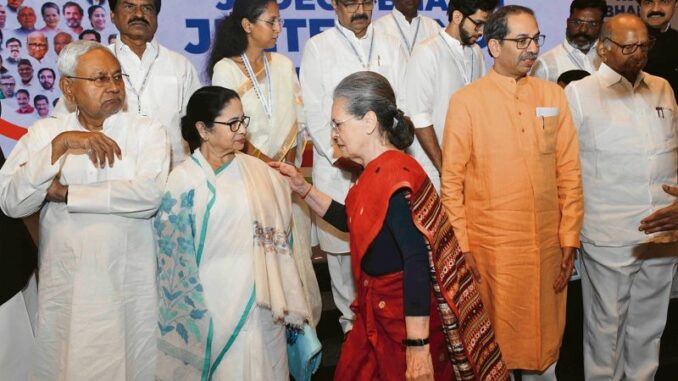
Parties well aware that a third term for Modi could wipe them off the national political landscape
Indeed, this year’s Assembly polls will shed light on where INDIA stands vis-a-vis the BJP on a host of issues.
“However, the biggest challenge for INDIA is to craft a narrative. At every step in the march towards electioneering, the BJP has stumped the Opposition by drawing upon various manifestations of the Hindutva discourse that are loaded with the potential to polarize the polity. If Rahul Gandhi strove to answer the BJP’s provocation by drawing a distinction between the Hindu religion and the political Hindutva espoused by the Sangh, the Congress’s ally, the DMK — a valuable INDIA constituent — took the debate to another level, questioning the basic tenets of Hinduism. On his ongoing European tour, where he has met parliamentarians and academics, Rahul described the Opposition’s battle against the BJP as a “fight for the soul of India” and maintained that based on his reading and understanding of Hindu religious texts, nowhere did the faith advocate terrorizing and harming people weaker than the oppressor. “So, this idea, the word Hindu nationalism, this is a wrong word,” he stated.”

The Union Government’s grandiose mission to reaffirm India’s primacy in the global order gained momentum with Chandrayaan-3’s insertion into the lunar orbit and successfully culminated in the G20 summit last week in New Delhi before Prime Minister Narendra Modi handed over the presidency baton to Brazilian President Luiz Inacio Lula da Silva. This year’s Assembly polls will shed light on where INDIA stands vis-a-vis the BJP on a host of issues.
The overwhelming ‘Vishwaguru’ honorific was affixed to Modi in 2022 itself, before the Uttar Pradesh elections. Among the themes then running through the BJP’s campaign was a depiction of the PM as a world leader whose ‘strong’ mediation in the Russia-Ukraine conflict thwarted the outbreak of the third World War. The claim gained currency in the political chatter heard even in UP’s boondocks. The success of the G20 summit — with its key takeaways being the please-all New Delhi Declaration which refused to condemn Russia’s invasion of Ukraine, the announcement of an ambitious economic corridor connecting Europe, West Asia and India, and the induction of the African Union — is bound to enhance Modi’s larger-than-life persona in the run-up to this year’s state polls and the 2024 Lok Sabha battle.
Where does the build-up leave the Indian National Developmental Inclusive Alliance (INDIA), encompassing as it does a wide swath of the Opposition, the Congress included, that has banded together for sheer survival? The parties in the alliance are cognizant of the possibility that a third term for a Modi-led BJP could wipe them off the national political landscape.
Hope, even in slivers, sometimes comes from unexpected quarters. On the day the summit began with the expected fanfare and extravaganza, the results of seven bypolls across six states were announced. These were the first to be held after INDIA’s formation. While the bloc’s leaders did not go as far as to claim that the outcome would be a referendum on the coalition, INDIA constituents won four seats, including Ghosi (Uttar Pradesh) and Dumri (Jharkhand). Ghosi was held by the Samajwadi Party since 2022, but a by-election was necessitated when its legislator Dara Singh Chauhan resigned and joined the BJP. The SP retained the seat with a huge margin (for an Assembly byelection) of over 40,000 that was brought about not by a carefully wrought caste equation but by the pooling of votes of all representative castes and Muslims. Even Dalits voted for the SP possibly because the BSP had not put up a candidate. BSP chief Mayawati’s directive to her voters was to go for NOTA but few, if any, heeded her order.
What did the bypolls portend for the Opposition bloc? Akhilesh Yadav, the SP president, who lost the 2014 and 2019 Lok Sabha polls, apparently realized the criticality of putting up a joint front against the BJP because he did not appropriate the credit for the Ghosi victory. “It is a victory for positive politics and a defeat for negative communal politics. It is Bharat starting towards INDIA’s victory,” he said. This despite the marginal role the Congress played in the by-election. INDIA stands as a durable coalition in Jharkhand, helmed by the Jharkhand Mukti Morcha, unlike its neighbor Bihar, where Chief Minister and JD(U) chief Nitish Kumar’s subjective reactions to events and developments cause unwanted conjectures about his intent. In Maharashtra, NCP chief Sharad Pawar’s periodic meetings with his supposedly estranged nephew Ajit Pawar (now the deputy CM in a BJP-forged coalition government) prompted the Congress and the Uddhav Thackeray-helmed Shiv Sena faction to pencil a ‘Plan-BJP’ without the NCP.
The existing political dynamics rule out a non-BJP alliance in West Bengal and Kerala, while the Left Front might be forced to seek the Congress’s hand in Tripura, where it has been steadily marginalized by the BJP.
However, the biggest challenge for INDIA is to craft a narrative. At every step in the march towards electioneering, the BJP has stumped the Opposition by drawing upon various manifestations of the Hindutva discourse that are loaded with the potential to polarize the polity. If Rahul Gandhi strove to answer the BJP’s provocation by drawing a distinction between the Hindu religion and the political Hindutva espoused by the Sangh, the Congress’s ally, the DMK — a valuable INDIA constituent — took the debate to another level, questioning the basic tenets of Hinduism. On his ongoing European tour, where he has met parliamentarians and academics, Rahul described the Opposition’s battle against the BJP as a “fight for the soul of India” and maintained that based on his reading and understanding of Hindu religious texts, nowhere did the faith advocate terrorizing and harming people weaker than the oppressor. “So, this idea, the word Hindu nationalism, this is a wrong word,” he stated.
DMK scion Udhayanidhi Stalin’s remarks against Sanatan Dharma were rooted in the Dravidian ideology, which was founded on the premise of weeding out Brahminism that was equated with Hinduism and Sanatan Dharma. While Stalin junior’s speech, delivered at a ‘Sanatan abolition’ conclave in Chennai, served the DMK’s political intent, it put the Congress in a quandary after the BJP demanded answers and clarifications from its leaders. Some took a safe middle path and steered clear of giving a straight reply, while former CM Kamal Nath, who unabashedly advocates Hindutva in his fight to wrest Madhya Pradesh from the BJP, repudiated Udhayanidhi.
Indeed, this year’s Assembly polls will shed light on where INDIA stands vis-a-vis the BJP on a host of issues.
(The author is a senior journalist)





Be the first to comment